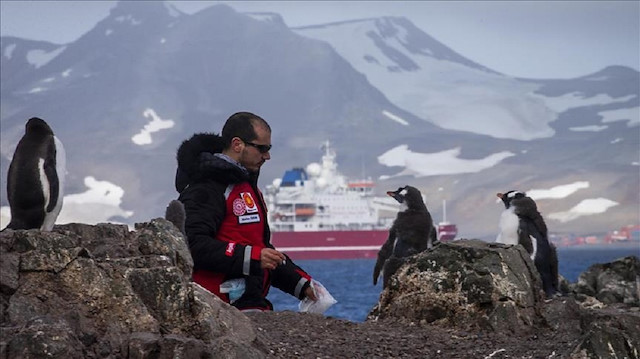
Frozen land attracts researchers with its rich natural resources and extreme conditions
Antarctica has long been the focus of explorers and scientific research teams with its challenging geography and climate.
They include a Turkish team of scientists that is part of the 3rd National Antarctic Science Expedition which is being accompanied by a team of journalists from Anadolu Agency, who are covering their progress and compiling data on the frozen continent.
Earth’s fifth largest continent, Antarctica covers 14 million square kilometers (5.4 million square miles) and is located in the Southern Hemisphere. With 98 percent of its total land area covered by ice, it contains up to 90 percent of Earth’s fresh water.
Its land mass also provides nesting areas and breeding grounds for various wildlife.
The lowest temperature on the continent was recorded at Russia's Vostok Station in 1983 at minus 89.2 degrees Celsius (minus 128.6 Fahrenheit) while the highest temperature ever recorded there was 14.5 degrees Celsius (58 degrees Fahrenheit).
Described as the biggest “desert” on earth, Antarctica is the coldest, highest, windiest and driest continent.
It is a natural laboratory for studying such things as climate, wildlife, weather and geology.
Remains of ice and sediment in Antarctica reveal clues about world history and possible climate changes while microorganisms found in the continent are valued for their enzymes, which are used to produce antibiotics.
Continent reserved for humanity
Antarctica, which has no indigenous inhabitants and is not ruled by any country, is called the “peace and science continent”. It has served as a scientific research zone since the signing of the Antarctic Treaty in 1959, which has 53 signatory nations.
The Council of Managers of National Antarctic Program (COMNAP), formed in 1988, consists of 30 members which have more than 100 scientific bases in moderately mild regions of the continent.
Turkey is also taking part in scientific studies in Antarctica. The project, which is supported by the Turkish Presidency, the Industry and Technology Ministry and Istanbul Technical University’s Polar Research Center along with other Turkish universities, will conduct a battery of scientific studies over the next 30 days.
The Polar Research Center was established in Antarctica in 2015 with the aim of conducting research and raising Turkey's profile among the international scientific community.
In April 2016, the first-ever Turkish team of researchers -- including doctors, botanists, geologists and oceanographers from seven universities -- traveled to Antarctica to study the impact of climate change.
Turkey currently holds “observer” status at the Polar Research Center but hopes to see this eventually upgraded to “consultative” status.
Hello, the comments you share on our site are a valuable resource for other users. Please respect other users and different opinions. Do not use rude, offensive, derogatory, or discriminatory language.
The floor is all yours.








